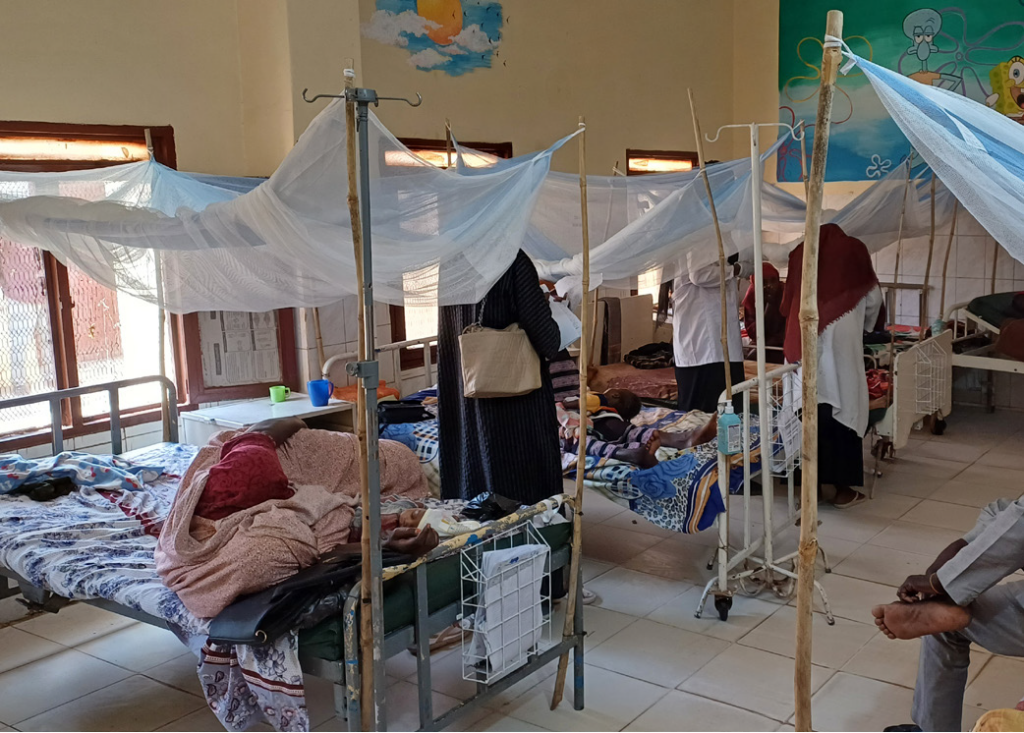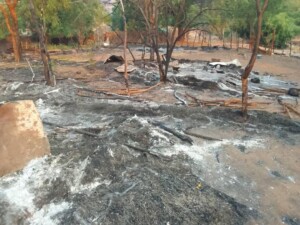Cholera outbreak in Sudan extends to six states

A health facility in South Darfur (File photo: MSF)
The cholera outbreak sweeping across Sudan has reached critical levels, with official reports confirming outbreaks in Khartoum, East Darfur, South Darfur, North Darfur, North Kordofan, and West Darfur. Health officials report hundreds of cases and dozens of deaths as the country faces compounding public health and humanitarian crises.
“The Khartoum state Ministry of Health has reported 1,375 new cholera cases and 23 deaths on Wednesday.” The ministry noted, “The number of cases increased from the previous day by more than 400, while deaths decreased by five.” The previous day, “the Ministry of Health in Khartoum state had recorded 942 cases and 28 deaths.”
“Sudan faces a major cholera outbreak, exacerbated by ongoing armed conflict and mass displacement,” said the Ministry, adding that the crisis has been significantly worsened by “widespread destruction of infrastructure, limited access to healthcare, and severe water shortages.”
Limited healthcare
Dr Mohammed Tijani, Director of the General Department of Emergency and Epidemiology in Sudan, confirmed that “the diarrhoea currently spreading in Khartoum has been identified as cholera through laboratory testing,” and that “the cholera recovery rate had reached 92 per cent.” He attributed the sharp rise in reported cases to “enhanced efforts by field clinics, response teams, and irrigation centres,” noting that “95 per cent of cases were among adults, while children accounted for five per cent.”
The Ministry also announced plans to expand emergency care by opening “250 irrigation centres within residential neighbourhoods” and equipping “12 isolation rooms in Khartoum state, with a total of 550 beds across Omdurman Children’s Hospital, Omdurman Teaching Hospital, Umbada Hospital, and El Nu Hospital.”
Volunteers reported that authorities “evacuated the cholera isolation centre at El Nu Hospital in Omdurman,” relocating patients to Mohammed El Amin Hamed Children’s Hospital and the Umbada Model Centre. Volunteers highlighted “a significant number of cases at the Omdurman isolation centre,” including children, and noted the provision of medical solutions but “a shortage of doctors and an urgent need for water and perfusion salts.”
‘Pressure on civil society’
Activists have also raised concerns about pressure on civil society. The Eighth Hot Revolution Resistance Committees in Omdurman condemned “the summons and interrogations to which volunteers Ali Jabbay and Ahmed Qassem… were subjected,” stating that “the summons came against the backdrop of spreading the truth and revealing the extent of the suffering caused by the spread of the cholera epidemic and the deterioration of health care.”
In South Darfur, the Ministry of Health recorded 110 cases and 10 deaths since May 27, including “13 new cases… and three deaths” on Tuesday alone.
In East Darfur, health officials reported “48 suspected cases of cholera and 10 deaths.” The Technical Committee confirmed, “one death yesterday from the Krio refugee camp in the locality of the Arabian Sea,” and “five deaths in Ed Daein locality, four in Abu Jabra, and one in Krio camp.”
“The health situation in the state is fragile,” said Ali Ibrahim Agibesh, Acting Director-General of the East Darfur Ministry of Health. He cited “the lack of capabilities and the lack of implementation of activities related to the fight against cholera,” and urged organisations “to join efforts and support for accompanying programmes and activities until the cholera epidemic is fully controlled.” He also called on organisations “to work jointly to prepare the isolation centre outside the hospital so that the epidemic is combated according to the protocol in the manner followed and the disease does not spread in the state.”
In North Darfur, the Emergency Rooms Council reported that “three cases among South Sudanese refugees have died from cholera” at the Dalil Babiker refugee camp in Al Lait locality, issuing an “urgent appeal to the health authorities to intervene immediately and save lives.”
In North Kordofan, civil leaders from Um El Sheikh village in Rahad Abu Dakna locality confirmed “five deaths and 30 cases of cholera,” noting “there is no treatment facility in the area.” The Ministry of Health reported “88 cases of watery diarrhoea” in Shikan, Um Rawaba, and El Rahad, and stated that interventions had begun, including “health awareness, chlorination of water, cleaning and environmental sanitation.”
‘Patients die before reaching hospitals…’
In West Darfur, officials confirmed a cholera outbreak in El Geneina, where “six cholera cases… including two deaths” were reported. The Emergency Room warned that “many patients die before reaching hospitals, while others avoid treatment altogether.” They also confirmed that an isolation centre is being set up at El Zahra school to manage the outbreak.
The Emergency Room praised “the swift response of health groups, especially Doctors Without Borders (MSF), the International Medical Corps, and others, for providing treatment and helping contain the outbreak.” It called on “international organisations, including the World Health Organization (WHO), to intervene urgently,” and advised the public “to avoid contaminated food and water.”
As part of nationwide containment efforts, the Federal Ministry of Health launched a vaccination campaign from Omdurman Teaching Hospital, targeting “2.6 million people aged one year and above” across “12 administrative units in five localities, namely Omdurman, Karar, East Nile, Umbada, and Jebel Awlya.”
“The vaccine is safe and effective and gives immunity of up to 65 per cent and rises to 100 per cent if other health precautions are adhered to,” said Sister Amal Mahmoud, federal supervisor of the campaign.











 and then
and then